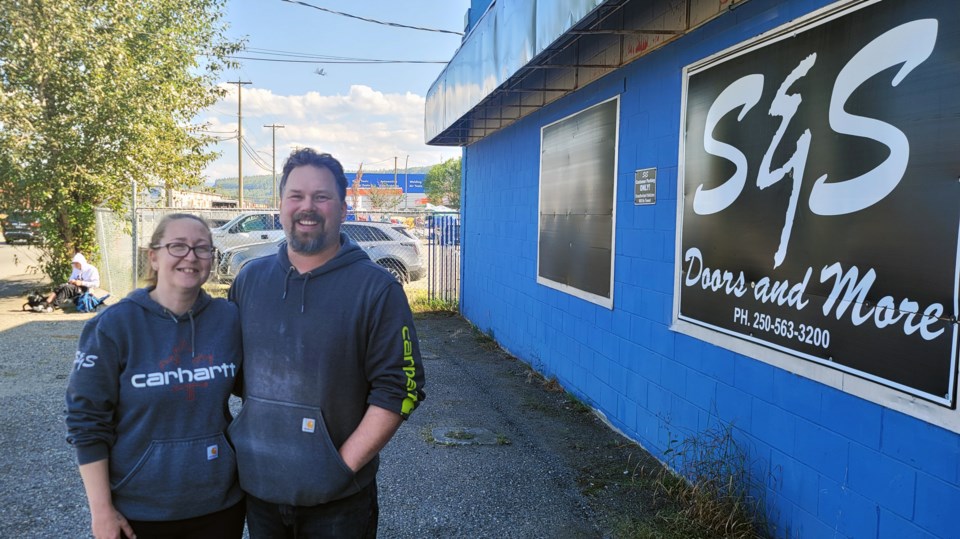Shawn Smeds won’t be sorry to see the Millennium Park encampment at First Avenue and George Street being closed down permanently.
Smeds and his wife own and operate S&S Doors and More at 1191 First Avenue, less than two blocks west of the homeless camp, and for nearly a year he’s watched his downtown Prince George neighbourhood deteriorate to the point where he sometimes dreads what a new day will bring to his retail business.
He’s all in favour of seeing the camp dismantled. He considers it an eyesore and an accident waiting to happen, but he says it won’t cure what ails the downtown core.
He says drug use is the root of the social ills plaguing our city and until the provincial and local governments find a way to deal with that issue to provide the housing and counselling services needed to wean people off drugs, nothing will change.
Smeds said there needs to be more permanent shelters like the Active Support Against Poverty (ASAP) housing unit the province opened this year in the former National Hotel adjacent to his store, which allows people to stay there with no requirement for residents to stop using drugs or alcohol.
“There’s plenty of places for them to go and plenty of help for them, but with the exception of this (ASAP) establishment next door, everybody needs to be clean,” said Smeds. “We need to stop supporting people’s drug habits or creating new drug habits and give people the help they need rather than just throw more garbage at them.
“I think giving them free drugs was the stupidest thing this government has ever done. If we’re supplying them, supply them only inside one designated building with doctors or nurses there to deal with a potential overdose.”
To try to prevent overdose deaths that kill an average five British Columbians every day, the province introduced a three-year safer supply pilot project in January. The harm reduction program provides regulated versions of some criminalized drugs such as prescription-grade heroin and fentanyl patches and has decriminalized possession of small amounts of hard drugs. By late June, 4,619 people were accessing the province’s safer supply of drugs.
But Smeds says the lack of safe injection sites available to drug users 24/7 has brought the BC drug experiment out into the open and downtown businesses owners are fed up with having people on their doorsteps shooting up or smoking drugs or using their parking lots as outdoor toilets.
Smeds has had the front doors of his store broken twice, the first which cost $1,000 to fix. Then again this summer, after he asked a group to stop smoking crack right outside his door, one of them kicked it and broke the glass, which cost another $600 to repair.
On Aug. 7, someone chipped away the stucco on the exterior of his building to expose the insulation and wood underneath, set it on fire and walked away. The fire smoldered for about 90 minutes before it was discovered and the fire department was dispatched and Smeds said they were “insanely lucky” the old wooden building was not destroyed. Video surveillance from the ASAP shelter caught the man in the act but Smeds said he thinks RCMP did not retrieve the clip as evidence and as far as he knows no arrest was made.
Smeds and his wife Shayle regularly walk around their property and are forced to pick up intravenous needles and crack pipes left by drug users. They find an average five or six needles each week. Often the needles are not used and they wonder why the Needle Exchange at 277 George St., gives out needles to clients as freely as it does.
The Smeds opened their shop in February 2022 after Shawn worked 26 years in the hardware retail sector in the city and he’s never seen the problems of downtown in a worse state.
“I had a customer come in the a few weeks ago who said she was scared to get out of her car, just because of where we are,” said Shawn. “Most of the people aren’t aggressive and then there are the ones who smash my window and smash my doors and light the building on fire.”
The Smeds have seen intoxicated people from Millennium Park stagger into oncoming traffic on First Avenue and they won’t miss seeing fire trucks and ambulances arrive there at least every second day. Shayle says she’s nervous about the possible negative repercussions of the camp being dismantled.
“I feel like they’re going to venture out and we’re going to have more people in the parking lots by the garbage cans because they have no place to go,” she said.



